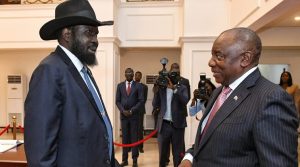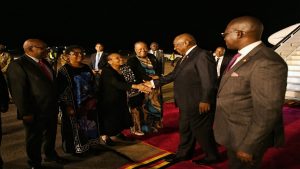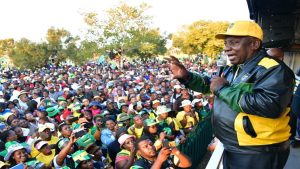President Cyril Ramaphosa says if the government is to advance social and economic rights, it must tackle poverty and inequality in the country.
Ramaphosa delivered the official Human Rights Day commemoration keynote address at the De Aar Stadium, in the Northern Cape.
The President says government cannot claim to care about the social welfare of its citizens if it can’t deliver basic services.
“If we are to advance and secure these social and economic rights into the future, then we need to tackle poverty and inequality. We need to create employment and economic opportunity.”
The President was welcomed by cheering crowds as he entered the stadium.
He was flanked by Northern Cape Premier Dr Zamani Saul, Sports, Arts, and Culture Minister Zizi Kodwa; and Minister of Justice and Correctional Services, Ronald Lamola.
During his address, Ramaphosa told locals that for the government to achieve its objectives, the country needed to grow the economy and achieve far greater levels of investment.
“The work that is being undertaken to increase investment in both economic and social infrastructure is a vital part of the effort to improve the provision of services to all South Africans. This includes investment in roads and rural bridges, in new housing settlements, in water schemes, and in expanding our electricity network,” adds Ramaphosa.
Ramaphosa: My responsibility (as the President) is to ensure that you are provided with basic services. Failure to consistently fail to deliver these basic services, is an infringement on the rights of those people. #HumanRightsDay #sabcnews
— Tshepiso Moche (@tshepimoche) March 21, 2023
VIDEO| Ramaphosa tells people here that he’s aware that in some municipalities, officials are stealing money and not providing services. He says everyone who steals public money will be arrested. #HumanRightsDay #sabcnews pic.twitter.com/KLah9V1n4S
— Tshepiso Moche (@tshepimoche) March 21, 2023
President Ramaphosa’s address comes as the country continues to battle many social ills, including GBV, inequalities, poverty, racism, load shedding, and high number of unemployment.
Over the last few months, the government has been criticized for not adequately addressing some of these social challenges that plagued the country.
In February, Statistics South Africa announced that the country’s official unemployment rate eased slightly to 32.7% in the fourth quarter of 2022.
This is a decrease of 0.2 percentage points from the previous quarter’s 32.9%.
But despite the slight decline, about 15.9 million people remain employed.
Other commemorative events are held by different political parties in different parts of the country.






